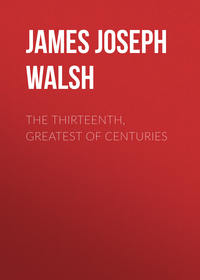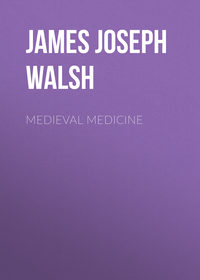 полная версия
полная версияMakers of Modern Medicine
Though of Irish descent, Dr. O'Dwyer illustrated very well the expression that was used of the English nobility who went to Ireland in Elizabeth's time, and who are said to have become "more Irish than the Irish themselves." O'Dwyer became an American of the Americans. He believed in meeting Americans on their own ground, cultivating their acquaintance, and making them realize the worth of new citizens of the republic by showing them how sincere was the patriotism of their recently admitted compatriots.
Dr. O'Dwyer was in everything the model of a Christian gentleman, and an exemplary member of the great humanitarian profession whose charitable opportunities he knew how to find and take advantage of at every turn in life. The American medical profession has never had a more worthy model of all that can be expected from physicians in their philanthropic duties toward suffering humanity, nor a better exemplar of what Christian manhood means in the widest sense of that expressive term. With an inventive genius of a high order, that gave him a prominent place in a great generation and that has stamped his name on the roll of medical fame for all time, there were united the simple faith, the earnest purpose, the clear-sighted judgment and the feeling kindness–those supreme qualities of head and heart that will always secure for him a prominent place in the small group of great medical men.
1
The life of Edward Jenner, M.D., F.R.S., Physician Extraordinary to His Majesty Geo. IV, Foreign Associate of the National Institute of France, &c. &c. &c. With illustrations of his doctrines, and selections from his Correspondence by John Baron, M.D., F.R.S., Late Senior Physician to the General Infirmary, Consulting Physician to the Lunatic Asylum at Gloucester, and Fellow of the Royal Medical and Chirurgical Society of London. In two Volumes. London: Henry Colburn, 1838.
2
Les Médecins Bretons par Dr. Jules Roger. Paris, J. B. Baillière, 1900.
3
The full title of this work of Laennec's is "De l'auscultation médiate ou traité du diagnostic des maladies des poumons et du coeur par R. T. H. Laennec." Its modest motto is the Greek sentence:

(The most important part of an art is to be able to observe properly.) The book was published in Paris by J. A. Brosson et J. S. Chandé, rue Pierre-Sarrazin, No. 9, 1819.
4
"Imo neminem hanc methodum expertum deinceps cum Baglivio dicturum esse spero: O quantum difficile est diagnoscere morbos pulmonum."
"Nostra enim aetas incuriosa quoque suorum (the italics are Laennec's own); et si quid novi ab homine coaevo in medio ponitur, risu ut plurimum ineptisque cavillationibus excipiunt; quippe facilius est aspernari quam experiri."
"Hoc mihi satis est quod bonis doctisque viris nonnullis acceptam aegrotisque multis utilem, hanc methodum fore confidere possim; hominem unum ereptum orco dulce dignumque meae atque etiam majoris operae pretium praemium fore existimem."
"I may say that no one who has made himself expert with this method will after this have occasion to say with Baglivi, Oh! how difficult it is to diagnose disease of the lungs."
"For our generation is not inquisitive as to what is being accomplished by its sons. Claims of new discoveries made by contemporaries are likely for the most part to be met by smiles and mocking remarks. It is always easier to condemn than to test by actual experience."
"It suffices for me if I can only feel sure that this method will commend itself to a few worthy and learned men who will make it of use to many patients. I shall consider it ample, yea, more than sufficient reward for my labor, if it should prove the means by which a single human being is snatched from untimely death."
5
Laennec, Sa vie et son oeuvre. Par Dr. Henri Saintignon. Paris, J. B. Baillière et Fils, 1904.
6
For much of the material embodied in this series I am indebted to Sir Charles Cameron, the Historian of the Royal College of Surgeons in Ireland, whose courtesy to me while on a visit to Dublin in 1904 is one of the precious memories I shall always cherish. At the same time Sir Christopher Nixon and Sir John Moore, for letters of introduction to whom I was indebted to Prof. Osier, not only gave me valuable suggestions, but demonstrated how kind is the Celtic nature at its best.
7
Virchow's Archiv, Bd. ix.
8
Gedächtnissrede auf Johannes Müller, von Emil Du Bois-Reymond, Berlin, Buckdruckerei der Königlichen Akademie der Wissenschaften (Dummler), 1860.
9
Some idea of the estimation in which Müller was held by his contemporaries, German and foreign, may be gathered from the number of scientific bodies of which he was a member. He was an associate in practically every serious scientific body in Germany. He was, besides, foreign member of the scientific academies at Stockholm, Munich, Brussels, Amsterdam; the scientific societies of Göttingen, London, Edinburgh, Copenhagen; foreign honorary member of the Academy of Sciences of Vienna; corresponding member of the Academies of St. Petersburg, Turin, Bologna, Paris and Messina; of the Society for Science at Upsala, of the Mecklenburg Naturalist Society of Rostock, of the Senkenberg Institute of Frankfort-on-Main, of the Academy of Natural Sciences of Philadelphia, of the Society of the Museum of Natural History at Strasbourg, of the Naturalists' Association of Dutch East India; member of the Holland Society of Sciences, Haarlem; of the Naturalist Society of Frieburg in Breisgau, Halle, Dantzig and Mainz; of the American Philosophical Society of Philadelphia, of the Society of Biology of Paris; honorary member of the Cambridge Philosophical Society, of the Natural Science Union of Hamburg, and the Natural Science Association of the Prussian Rheinland and Westphalia, of the American Academy of Arts and Sciences in Boston, of the Ethnological Society of London, of the Microscopic Association of Giessan, member of the Society for Science and Medicine at Heidelburg, of the Naturalists' Society at Dresden; corresponding member of the Scientific and Medical Association of Erlangen and Moscow; member of the Academy of Medicine of Paris; honorary member of the Academy of Medicine of Prague and of Dorpat, of the Medico-Chirurgical Academies of Wilna and of St. Petersburg, of the Medical Society of Guy's Hospital in London, of the Medical Society of Edinburgh and of the Hunterian Society of the same city, and of the Medico-Chirurgical Societies of London and of Zurich, of the Medical Societies of Budapest, of Lisbon, of Algiers and Constantinople; corresponding member of the Medico-Chirurgical Academy of Turin and of the Medical Society of Vienna.
Even this long list does not include all his various honorary and active memberships in scientific and medical societies. He was, besides, the laureate, that is, a prize winner, of the Medical Faculty of the University of Bonn, of the Sömmering Prize of the Senkenberg Institution, of the Copley Medal of the Royal Society of London, of the Culver Prize Monthyon of the same institution, as well as laureate of the Academy of Sciences of Vienna for Experimental Physiology. He had been honored by the King of Prussia by the conferment of the knighthood of the Order of the Red Eagle, by the King of Sweden by the Royal Swedish Order of the North Star, by the King of Bavaria by the Royal Bavarian Maximilian Order, and by the King of Sardinia by a knighthood in the Order of SS. Mauritius and Lazarus.
10
Herman von Helmholtz, von Leo Koenigsberger. Bd. 2, Braunschweig, Friedrich Viewig und Sohn, 1902-3
11
Mikroskopische Untersuchung über die Uebereinstimmung in der Structur und dem Wachsthum der Thiere und Pflanzen, 1839.
12
Heureux celui qui porte en soi un dieu, un idéal de beauté et qui lui obéit; idéal de l'art, idéal de la science, idéal de la patrie, idéal des vertus de l'Evangile.
13
Ce sont les sources vives des grandes pensées et des grandes actions. Toutes s'éclairent des reflets de l'infini.
14
L'Histoire d'un esprit, par M. Duclaux, Paris, 1896.
15
New York: Dodd, Mead & Co., 1904.









